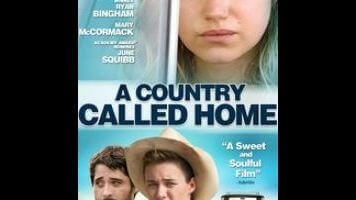So many movies have such simplistic ideas about small towns that A Country Called Home’s attempt to have it both ways actually might count as laudable. When Ellie (Imogen Poots) grudgingly returns to her podunk Texas hometown to help sort out the affairs of her deceased father, she encounters small-minded, provincial jerks as well as the kinds of quirky, goodhearted people who so often populate non-city settings for movies. Neither type of character is especially well-drawn, but the movie is nothing if not fair-minded in dealing with the false city-versus-country dichotomy. Ellie’s first-night tour of the town’s attractions may be limited to a Dairy Queen and a dive bar, but then again, her life back in Los Angeles includes a shiftless, borderline accidental boyfriend who literally loses his shirt in a poker game.
If Country is refreshingly upfront about the fact that the population numbers of a particular location will not, in fact, determine its moral center, it’s less wise when it comes to the familiar mix of reluctant grieving, lesson learning, and boring acoustic guitar music the movie tries to sell. A Country Called Home confirms the universality of boring acoustic guitar music in sensitive indie movies by not only having Ellie meet a country-ish singer-songwriter named Reno (Mackenzie Davis) but also including the detail that Ellie’s alcoholic mess of a father built and repaired vintage guitars. There will be no healing without strumming, apparently.
Not every scene in the film strums false. Ellie, an aspiring furniture designer stuck in a rut, hasn’t spoken to her father in years, and an early scene with her brother (Shea Whigham) gets across the weary bond of estrangement. It’s especially impressive for briefly making a halfway convincing case that Poots and Whigham might come from the same gene pool. (It must be good acting, because it sure isn’t an uncanny physical match.) There’s also a moment where director-cowriter Anna Axster manages to interrupt a cliché in progress: In the scene where Ellie begs at an airline counter to be let on an overbooked flight to Texas, she gets the call that her stroke-victim father has already died, rendering her desperation moot with sadness.
Why Ellie continues on her trip anyway is not made entirely clear—to the audience or to her. As she encounters her father’s mess of a common-law wife Amanda (Mary McCormack) and wrestles with his dubious legacy, many of her lines amount to an addled “huh?” She seems most comfortable around Reno, who’s a transgender man—a detail the movie treats with remarkable matter-of-factness, to the point where the main characters never really discuss it. It’s also nice to see a friendship between Poots and Davis after they were both forced to show peak bro tolerance in That Awkward Moment; there’s a touch of Garden State gone platonic in the way they form a quick and easy friendship in such dire circumstances.
But Country, while not especially eventful, has more in mind for Ellie than following her new friendship. As she putters around town, staying longer than she initially intended, Axster continually tinkers with the movie’s zaniness levels. At one point, she mounts a borderline slapstick funeral scene; at another, she has Ellie and Amanda’s son Jack trade sad-backstory monologues. Jack is played by Ryan Bingham, who does not sing or play music in the movie, but is presumably on hand in case he needs to step in and do some auxiliary strumming. (He does, just not on screen.)
At least Ellie’s relationship with Jack doesn’t overload on melodrama. Neither does her friendship with Reno. A Country Called Home never goes all-in on the implied cornpone of its title—but it never really goes all-in on anything else, either. There are a lot of bad things this movie doesn’t do, which is not quite the same as doing anything particularly well.

